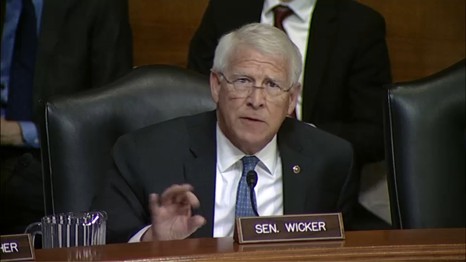This week, Senator Roger Wicker, who is a senior member of the Senate Armed Services Committee, attended a hearing to consider Admiral William F. Moran, the nominee for Chief of Naval Operations, and Lieutenant General David H. Berger, who was nominated to be Commandant of the Marine Corps.
Wicker asked the presumptive service leaders about their support for important shipbuilding programs, including the LPD and LHA class amphibious ships that are built in Mississippi. LHA 9 and LPD 31 secured significant funding from Congress in last year’s defense appropriations bill, but the Office of Management and Budget removed the ships from this year’s budget proposal.
“I think we have the flexibility and capability and smarts to find a way to move money around and go ahead and stick with the plan that we enacted last year,” Wicker told the panel.
Amphibious ships enable the Navy and Marine Corps to launch close range attacks in contested environments like the ones found in the Pacific Ocean near China.
“I don’t believe there is any more versatile capability than an embarked Marine force on an amphibious ship,” Lt. Gen. Berger said.
Wicker also asked about the effect of a continuing resolution or budget sequester on the Navy and Marine Corps’ ability to fight.
“The worst part about it for us is the unpredictability,” Lt. Gen. Berger said. “You don’t know … how long the continuing resolution will last. So, at best, you try to hold your head above water with what you’ve got. But what really happens is an erosion of readiness and in jeopardy is procurement. If it’s [a] BCA [sequester] it is even more catastrophic.”
Admiral Moran agreed that budget uncertainty can have far-reaching impacts on America’s industrial base.
“The stability of a capital-intensive force like the United States Navy with large contracts on large ships and submarines and aircraft really affects our vendor base, really affects the industry,” said Moran. “They need stability, they need predictability to be efficient, to hire appropriately, and to be able to maintain our equipment.”




